The Landlord Tutor Promise
To know more about deleading, how to delead your property, and other ways to ensure your property is safe for tenants of all ages, join the Landlord Tutor community and sign up here.
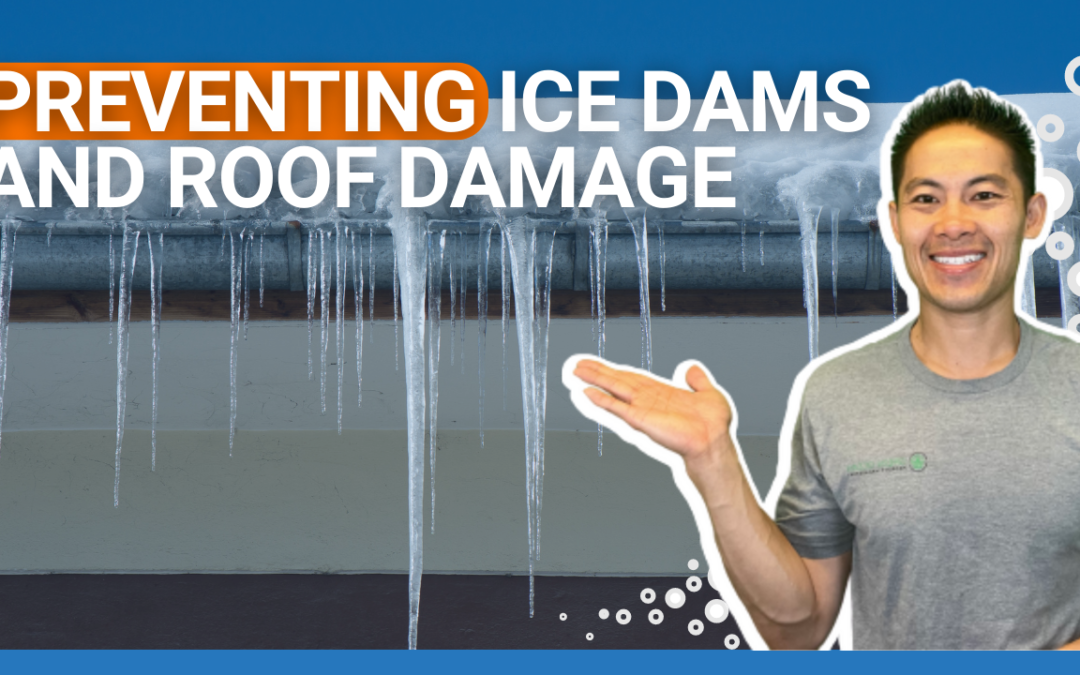
Ice dams can be a nightmare for homeowners and landlords. They cause water damage and destroy shingles, costing thousands of dollars to fix.
So how can you prevent ice dams and roof damage? Read this article to find out.
Gutters allow surface water from the rain to run off your roof. But the surface water has no place to go when a gutter is clogged.
So what ends up happening is that water fills up, runs down the side of the house, freezes when the weather is cold, and builds up on the roof as ice dams.
You can have blocks of ice and water stuck in there. It will build up inside, even underneath the shingles.
When the heat from inside the house rises, the ice on your roof melts. This causes water damage to your unit, leading to further issues such as mold.
When gutters are filled with debris, they can be messy and dangerous to clean. As part of roof maintenance, property managers should clean out gutters to prevent roof damage.
We suggest cleaning your gutters at least twice a year. It’s easy to do, and perhaps you can do it yourself, but you have to ensure you have the proper personal protective equipment (PPE) so you don’t fall off.
But as a proactive property manager, I make sure to do this on a recurring basis and take care of the roof gutter maintenance for our landlords.
Gutters are vital in protecting your home from water damage that can crop up due to ice dams. Most homeowners find it more cost-effective to fix minor gutter-related issues than repair significant roof damage.
The better and more often you keep your gutters clean, the safer you and your home will be, especially in the winter.
Keeping your gutters clear can help prevent ice dams and roof damage. To know more about ice dams and how to avoid them, join the Landlord Tutor community and sign up here.

Lead is a very toxic element in paint. So, landlords must delead their property to prevent health risks, especially for children under six.
As a full-risk deleader, I explain why and how you should have your property deleaded.
Lead is a metallic substance that makes paints produced before 1978 to be brighter and more durable. Later on, it was discovered that debris or dust from lead paint has harmful effects if it were ingested or inhaled.
It affects any person no matter how old they are, but children under the age of six can have more complications from lead paint because they are still developing. So lead was removed from all paints after 1978, with laws regulating it.
But just because lead was removed from paint production doesn’t mean it was no longer an issue. There are still houses with paint containing lead, so this is where professional deleaders come in.
First, know if your house was built before 1978. If it isn’t, you really don’t have to worry about it because paints produced after 1978 are all lead-free.
In Massachusetts, they require the landlord or property manager to conduct a deleading if a family has a child under the age of six.
It’s not enough to say you do not know if your home or property was built before 1978. In Massachusetts, there is a database where you can type in your address and see if there are any reports of any certifications saying your property has been deleaded.
You can even look at the report details and see if they found any hazards. If there’s nothing, that means that the property hasn’t been tested yet.
It is actually good practice to have the test done in advance so that you know what you’re dealing with and have it deleaded. Should you want to sell your property, deleading it increases the property’s value.
The rentability of your unit will also improve because you’re now opening up your property to children, and you can advertise it as such.
Hiring a lead inspector starts at about three hundred dollars per unit. If you have multiple units to inspect, you might get a discount.
If the units are larger, the inspector will go room by room by room, both on the interior and exterior. They use something called the XRF laser gun and press it against certain malleable aspects of your property, such as your windows.
You will get the report back and know if you must delead your property.
When you send the inspector’s report to a deleader, they should come to your property and give you an estimate based on the work they need to do.
There are different types of deleaders. You can hire a moderate-risk deleader or a full-risk deleader, also called “class 1” in Massachusetts.
Full-risk deleaders have higher education and higher license. They have to pass exams and have the right insurance to cover themselves, as it can be expensive to pass these tests.
I am a class 1 deleader, and I became one because I had so many clients who needed to delead their property. I also purchase properties, so I get to ensure that the property is safe for anybody, especially those with children under six.
Being a full-risk deleader gives me the real knowledge and ability to walk someone through this process and explain if they should delead their property.
I can also offer them better-discounted rates over other deleaders, especially because there is only a small circle of deleaders in Massachusetts.
Your deleader will explain to you the deleading timeline. If a family or tenant currently resides in the property, you must house them elsewhere.
So you will have to pay for their temporary housing, whether an Airbnb or hotel, while the deleading is ongoing.
The timeline depends on how much work needs to be done. Your deleaders must make preparations to ensure that even the neighbors are safe, such as putting up signs.
The process is usually concluded with a very thorough cleaning. Then, the lead inspector will return and do another test which you have to pay for again.
Lead inspectors will do a wipe test. This ensures that there is no dust, particles, or anything that can cause issues. If someone was scraping, dust could go anywhere. Inspectors want to ensure that residents are safe to move back in.
Usually, they send the wipe test to our lab. They can pay for rush results. Generally, it takes about three to four days to get the test results back.
The results will determine if you pass or not. If you don’t, you must work with your deleader again to correct any other issues.
If you pass, you will have your certification and your property will be updated in the database.
To know more about deleading, how to delead your property, and other ways to ensure your property is safe for tenants of all ages, join the Landlord Tutor community and sign up here.
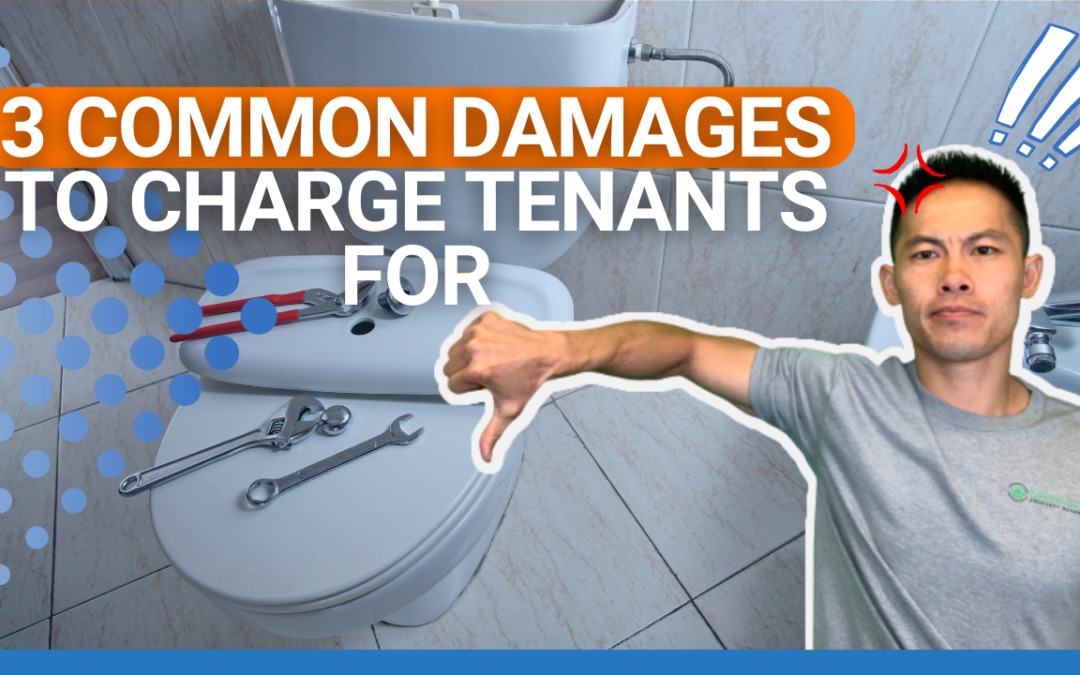
Over the years, we have worked with countless landlords for hundreds of properties. We help our landlords earn and save money, but we also hold our tenants responsible for certain damages they cause.
Here are the three common damages that you can charge tenants.
As a proactive property management company, we always look out for our landlords’ best interests. We think of ways to save our landlords money.
But, most importantly, we hold our tenants responsible for their actions and the damages they incur.
Whether you’re a small-time landlord or own several properties you rent out, there’s always something tenants can do that will cost you money.
As an overview, these are the three most common damage you should charge tenants for.
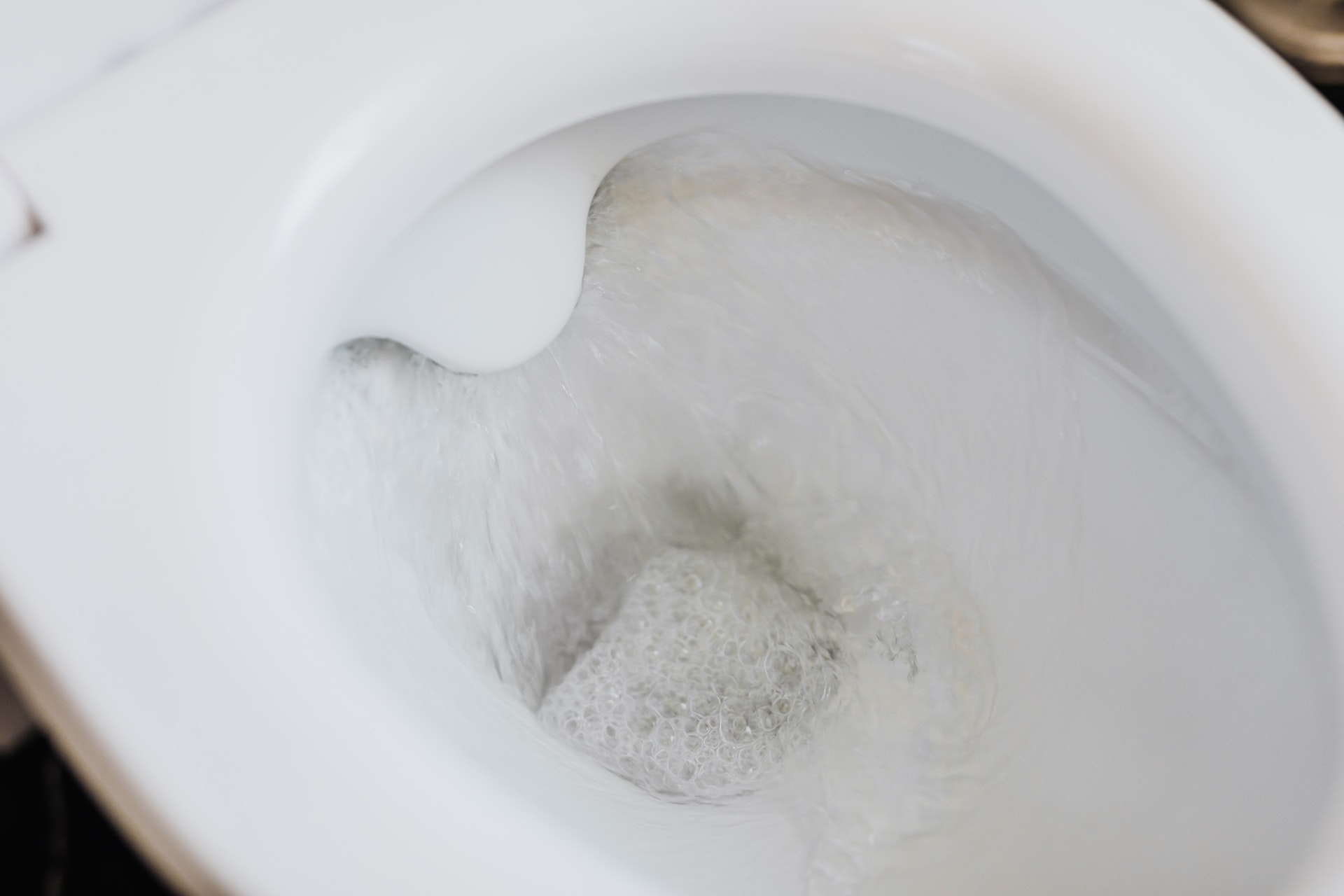
As part of our regular property inspections, we always ensure that the bathrooms are in good condition, especially the toilets and their flush.
But sometimes, tenants will flush something on purpose or by accident which can cause clogging. The most common bathroom items to be flushed down the toilets are toothbrushes, tampons, or toilet paper.
Of course, if they call us about clogged toilets, we come over and fix them. But we bill them back for the charges as stated in the lease.
Kitchen and bathroom sinks are also prone to damage. Most kitchen sinks also have disposal.
This makes kitchen sinks likely clogged by bottle caps, oil, or leftovers flushed down the drains, causing backups.
Since sink backups are caused by things that can be prevented, it is something that tenants are responsible for. So for disposal cleanup or repair, we will bill tenants for the costs.
To save on painting costs, we typically use the same paint color in all of our properties. Doing so makes it easy for us to know when tenants change the wall paint.
If they paint the walls, they must change them to our standard color. The paintwork must be done by professional painters who would charge a set price which we would then send the bill to the tenant.
So tenants know how much the painting costs would be, and we include this in the lease. They must get our approval in writing if they want to change any paint color.
If they didn’t seek our approval and the paint is unchanged when their lease expires, we will still charge them when we have the walls repainted.
To know more about holding your tenants accountable and minimizing your expenses, join the Landlord Tutor community and sign up here.

The math behind hot water tanks and their warranties is not something to overlook. Here is a brief explainer about some water heater facts and why you should check on your warranty today.
Water tanks usually come with 6, 10, or 12-year warranties, with the price increment at $100 to $250 at most.
Many of our landlords want an additional four years from a hot water tank, but here’s the truth about it. Even at years 6 to 9, it’s not like you get a brand-new hot water tank.
Sellers see how much time is left on your warranty and will give you a pro-rated amount. Let’s use a $1000 example for a hot water tank. If that hot water tank has a 10-year warranty and you are already in your 9th year, the warranty will only give you $100.
You are not getting an entire brand-new tank for anything at year nine; you must pay another $900.
Most landlords think their water tank is covered or that it is under warranty. Worse, they think they don’t have to pay for it!
The warranty does not pay for labor. The plumber still has to return the tank and get a new one. Not all plumbing companies will go to Home Depot to return and get you a new water tank.
When it comes to warranty, there are hot water tank companies that guarantee a full value. It is amazing how companies will make it a little nicer to extend longer because you are paying for it.
Some hot water tanks last a long time. You want to be proactive about hot water tank maintenance, especially if they are located on higher floors.
A damaged hot water tank can flood an entire unit with 40 to 50 gallons of water. If located somewhere upstairs, water can flood the rest of the floors beneath it. The damage might be more manageable if the water tank is in the basement.
To know more about purchasing hot water tanks, saving money, and understanding warranties, join the Landlord Tutor community and sign up here.
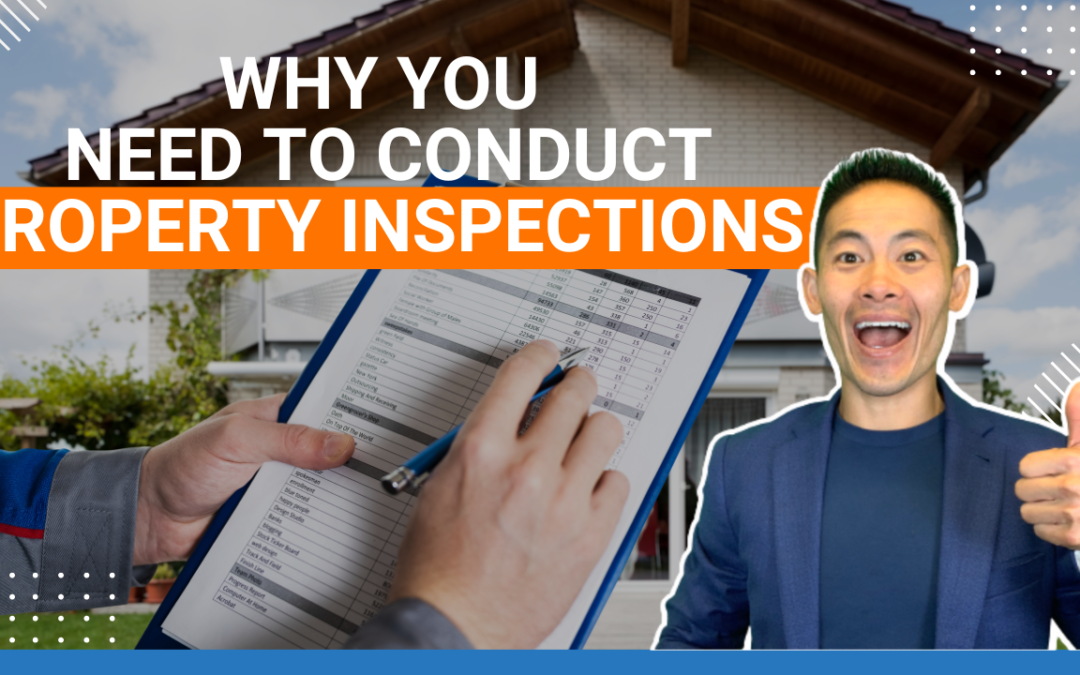
A thorough inspection is one of the most important aspects of owning an investment property. Today, I explain why you need to conduct these inspections from my perspective as a licensed home inspector.
Property inspection is when you or a licensed home inspector walks through the entire property and thoroughly checks it for any issues or damages.
It is one of the most basic management tasks; whether it’s a minor check-up or a thorough inspection, property inspections help you ensure a property is functioning to its maximum potential.
Here are three reasons why you shouldn’t skip inspections on your property:
Loose steps, flaking paint, and busted lighting are some issues that could get you into trouble.
Anything that can cause someone to get hurt would be your responsibility. These are all liabilities that you can get sued for and would go under your insurance, and you wouldn’t want any of that.
We conduct inspections twice a year using the software called zInspector. It allows you to document your property’s condition with photos, videos, and detailed annotations that are securely stamped with the date and time and geo-located to the property address for easy reference.
Your property’s condition is important, whether you’re putting it up for sale or when it’s being used as a rental. You should conduct property inspections before you offer a renewal on your lease or while the current tenant is still staying in the property.
We may offer a lease renewal if they keep the property in good condition. If they’re not, we might not offer that renewal, but at least we can talk to them about remediating the damages and treating the property better.
Probably the most important reason to conduct property inspections regularly is to have documentation. Even if tenants claim not to be responsible for the current damages on the property, you can show them proof.
You can use those inspection reports to compare the state of the property before and after they occupied the unit. With documentation, you can charge them for repair costs by deducting the amount from their security deposit.
My experience and expertise as a property manager and home inspector allow me to give insights into how property inspections can help protect you and your investment property.
Join the Landlord Tutor community and sign up here to learn more about property inspections and keeping your investment properties profitable.

What’s a surefire way to make a property for lease or sale stand out? Home technologies. Here are three of our favorites that will impress your tenants and improve their overall experience in your property.
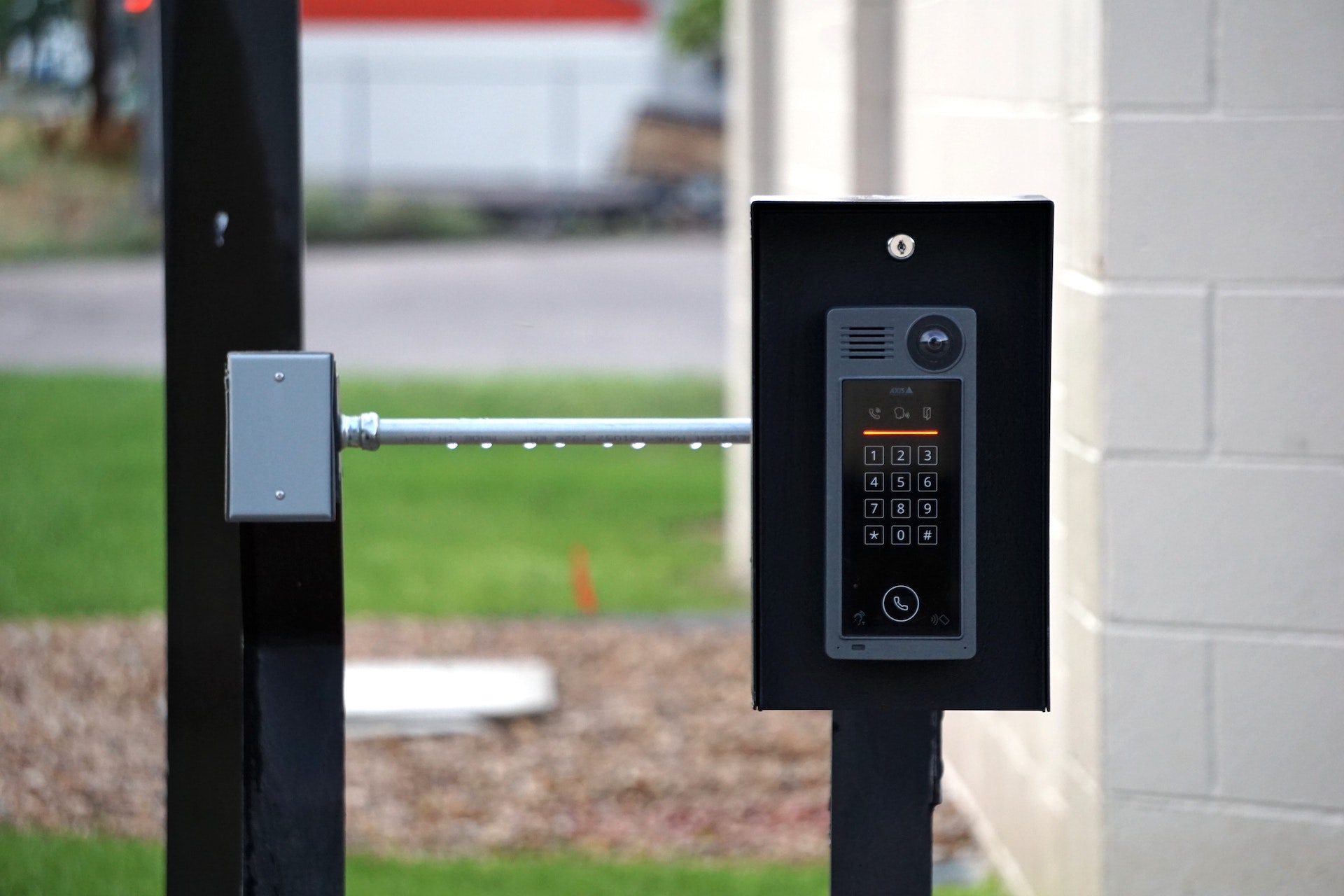
Tenants never have to worry about bad keys, losing them, or even locking themselves out ever again!
Usually, you can create temporary codes for dog sitters or walkers and allow them to only have it for a certain time frame. With keypad locks, you can change the code anytime for increased security.
As a smart device, a nest thermostat keeps track of when tenants are home and what their preferred temperature is.
It is much better than the older thermostats that just stay at one temperature until they are turned on or off. With nest thermostats, tenants also save money.
Nest thermostats can also be programmed using a phone app, so tenants can turn the heat on or off even if they are not at the property.
Imagine a tenant living on the second or third floor, and someone rings the bell. They would have to run all the way down to figure out who was at the door.
Tenants love to feel secure, and a doorbell video camera allows them to see who is at the door, even on their phone. This gives them that additional layer of security and convenience in your property.
As a property manager and owner, I am always on the lookout for the latest industry trends to keep tenants happy. To know more about home technologies and other ways to impress your tenants, join the Landlord Tutor community and sign up here.